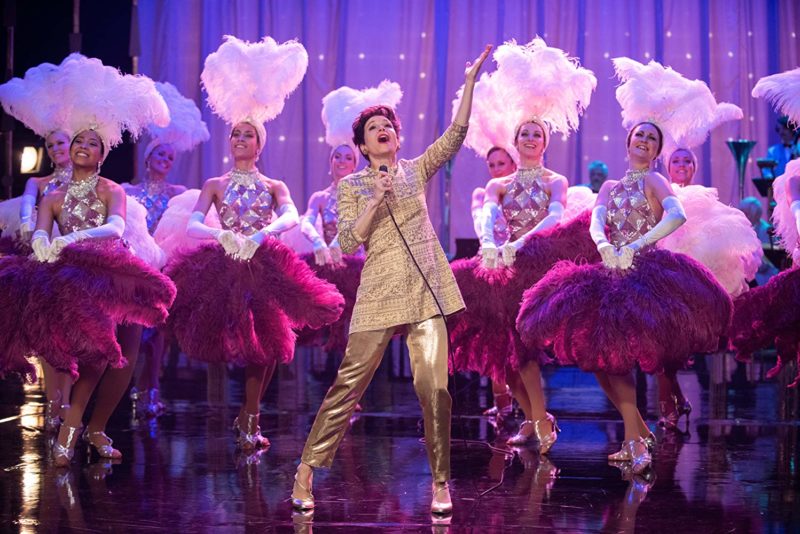Judy Garland: The Brilliance and Tragedy of Fame

The new movie about Judy Garland’s life, with a special focus on her last years, was far better than it needed to be. At the very time when the travails of the struggling artist, brilliant on the outside but tormented on the inside, threatens to become a cliche, this film comes along to infuse new life into the entire genre. It’s a movie that tugs very hard on the heart and soul.
It left me in tears of sadness and joy.
Renée Zellweger gives a mind-blowing and unforgettable performance as Judy, trying desperately to maintain her dignity while poisoning herself with dangerous levels of substance abuse, losing her children in a custody fight, mismanaging finances, and slowing destroying herself while resisting any serious attempt to help her. The decline and fall but final triumph of Judy are felt in every scene.
I can’t imagine how Zellweger did it, managing all at once to look drugged up, wisened, charming, deeply sympathetic, and outrageously talented. So true. So believable. Thanks to this actress, even at Judy’s petulant worst, the audience never loses affection for her. You begin to read every facial expression, every bodily posture, every verbal utterance because we the audience worry too: will she make it through this next performance or will she crash and burn?
Judy Garland died 50 years ago this year, which is probably about the amount of time that needs to pass before such a personal and painful story as this can be told with compassion. Many generations have been profoundly affected by her signature and timeless role in The Wizard of Oz. It alone was enough to immortalize her but it also led to her gradual destruction, despite every cinematic triumph (there were many) that followed.
There was the substance abuse, yes, but the other problem is something that affects people in different ways: fame itself. Fame means that a second version of yourself has been created for public consumption that is quite different from the private self. Who created it or when it happened is rarely quite clear. You can’t cause it to happen and yet you bear full responsibility for its existence. It is this ephemeral thing that resists quantifiable measurement and yet you know it is there. Once it is there you both hate it and love it.
The masses adore you but in your heart you don’t believe a word of it. You know you are a ridiculously normal human being. Every artistic genius imagines himself to be a fraud and fears being found out, which is why the praise is so essential; it becomes the means by which you assess the value of both the public and private versions of yourself. So you can never let fame die, and when it diminishes even slightly you have a sense of impending death.
The truly famous feel like they swim in hypocrisy, and ultimately embrace it with a sense of irony. The drugs often taken by high-performing artists serve as a hallucinogenic proxy for the unity they seek between who they are biologically and the spirit they cast which is both adored and devoured by the rest of the world.
Today of course there are ever more opportunities to achieve fame, even of the most petty sort. How many followers on Twitter can I get? What tribe can I join and become a famous meme warrior? Maybe if I shill enough products on Insta, I can be a paid influencer, just like that person I follow and secretly envy. My video went viral once; maybe I can do it again and then compete in the big leagues. People exhaust themselves in seeking fame as an end in itself.
As silly as all of this sounds, I’ve seen people sell their souls for the goal of social-media fame. When it doesn’t arrive – or when it is tasted and withdrawn – the result can be quiet despair. It’s a painful reckoning that, if handled well, can lead to a better life. It can cause the dawning of a realization that “famous for being famous” is not really a viable model for life achievement.
Fame is more often inadvertent, the accidental result of real skills, incredibly hard work, and dazzling creativity – and most often this comes about not with the purpose of fame but rather flows from a burning passion for achievement, whatever that means. The desire to produce comes first. Once fame arrives, it’s best for the human spirit to ignore it as much as possible. But this is the mature response that is not available to a person like Judy who experienced it all at far too young an age.
In Judy’s case, she was an unbearably brilliant talent. No amount of coaching, makeup, costuming, scenery, or scripting could cause what she created to happen. All the accouterments added by the studios purified the results but the core was just Judy. In the end, it was she, the consummate performer who made her fame happen for herself. Every bit of it was earned and deserved.
But she never believed it. She was convinced that it was all make-believe, a fictional world built around her that didn’t reveal the truth of who she was. It was this very bifurcation between the two Judys that tore her up and shattered every relationship she had. You could say it was self-destructive, absolutely. And yet the astonishing talent was always there. Here again, I can’t help but celebrate Zellweger’s rendering that captured exactly her larger-than-life talent even at the rock-bottom of her personal life.
Further, I can’t recall a film that so saliently deals with a problem that I think we’ve all encountered. Someone around us is on a downward slide, faced with tragic problems stemming from terrible decisions. The person is surrounded by people who love him or her and want to see things turn around. And yet everyone is powerless to do anything about it, simply because of that great barrier of individual human volition. People are going to do what they do. No amount of love or force, or sacrifice of your own personal well being, is going to change that.
So we watch Judy’s life sliding toward its merciful but tragic end at the age of 47. We watch and take in all its pain. I think about people I’ve known in my own life who followed a similar trajectory, awesome talents with dark private lives who I and many others tried to help but without success. The very same tenacity that generates their epic brilliance also makes them stubbornly impervious to influence from even those who care deeply. Their choices cause so much suffering for everyone directly around them, and yet the whole world celebrates them as impossibly magical and blessed.
Dare I mention names and stories? I want to but it is too soon. I’m taking my cue from this film: Fifty years is the right time. We can only absorb so much difficult truth about people we know in their own times, which is precisely why we should pay such close attention to the biographies of those who have come before. To listen, to learn, to understand. To forgive.
We live in strangely intolerant times. We are surrounded by witch hunts. Has this famous person done something bad, uttered a politically incorrect remark, had too many one evening and made a mistake, have a strange dark side, thought an unfashionable thought, or otherwise violated some canon of propriety that has only existed for a few months? If so, let’s kill him or her for good and forget he or she ever existed, regardless of their talent or how epic their contribution to our lives. Drive the snake out of our otherwise perfect garden!
This whole ethos is a sure way to suppress genius. Thank goodness that this never happened to Judy, she of five marriages and uncountable numbers of missteps and scandals and financial disasters. She was a spectacle, the subject of endless gossip, the target of nonstop pathos and disapproval. And yet, through it all, there was love, love for her achievements, her art, her gift to the world. So should it always be.
This film reveals both Judy Garland’s genius and her catastrophic life to the whole world in ways that make us frustrated but ultimately grateful for her personal sacrifice for the sake of art, culture, and the well-being of humanity. As her signature song says, it’s the journey that matters more than the destination.










